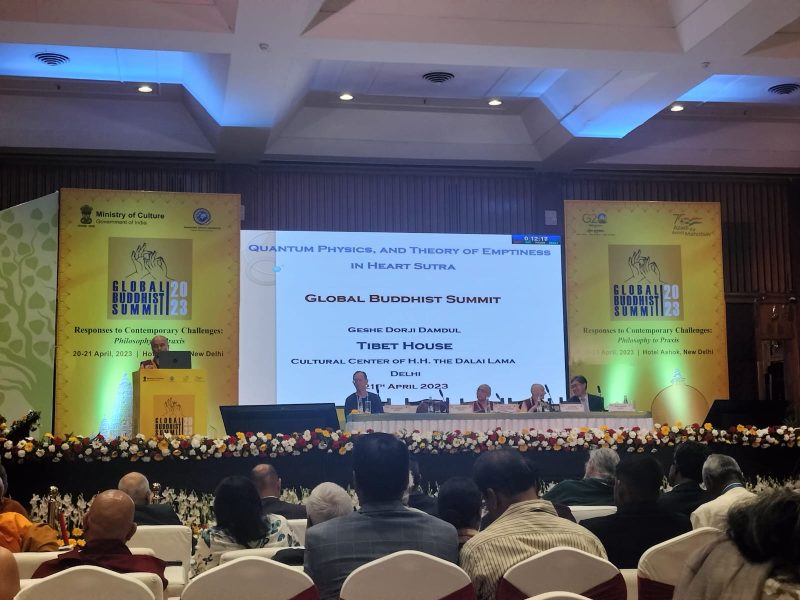
Global Buddhist Summit: An assertion of India’s growing soft power

The two-day ‘Global Buddhist Summit’ that concluded on Friday in the national capital with the Delhi Declaration can be seen as an assertion of India’s growing soft-power clout and an attempt to initiate Buddhist response to the unprecedented crisis that the world faces.
Over 170 prominent monks, scholars, and practitioners from 30 countries deliberated upon how the wisdom of Buddhism can be harnessed to solve contemporary global problems.
The summit explored how Buddha Dhamma’s fundamental values can provide inspiration and guidance in contemporary setting and concluded that peace was the foundation for human happiness and well-being.
The Global Buddhist Summit has been held at a time when India holds the presidencies of the G20 and Shanghai Cooperation Organization (SCO), and is keen to be a voice for the Global South.
Also read: Lord Buddha’s ideas offer solution to global problems: PM Modi
From philosophy to praxis
Elaborating on summit’s theme – ‘Contemporary challenges from philosophy to praxis’ — T Gyatso, research officer at the Namgyal Institute of Tibetology, said one can tackle many of the contemporary challenges by drawing lessons from Buddhism’s basic tenets.
“By applying the principles of Buddhism, the world can find a lasting solution to many of the problems,” he told The Federal.
Pointing out that not only such fora provide political mileage but they would also help in deepening the cultural ties between India and its neighbours. The summit showed Delhi’s commitment to preserving the region’s Buddhist heritage, Gyatso said.
Steps taken by India such as developing the Buddhist circuit in India and Nepal, rejuvenating pilgrimage centres like Sarnath and Kushinagar, and building an India International Centre for Buddhist Culture and Heritage at Lumbini with India’s cooperation, show the country commitment to preserve Buddhist heritage and promote Buddha’s teachings.
In fact, India has made Buddhism a prominent feature of its diplomacy which reflects in Delhi’s ‘Act East’ policy, which aims to counter China’s growing influence in the region by cultivating bilateral economic and strategic relations with Indo-Pacific nations.
Multiple themes
The sessions at the summit focused on multiple themes like Buddha Dhamma and Peace, Buddha Dhamma in relation to environmental crisis, health and sustainability, the conservation of the Nalanda Buddhist Tradition, and Buddha Dhamma Pilgrimage, Living Heritage, and Buddha Relics.
“These discussions aim to provide a strong foundation for India’s long-standing cultural connections with countries in South, Southeast, and East Asia,” a functionary at the summit said.
The summit’s theme was reflected in Dalai Lama’s speech. Focusing on the concepts of compassion, wisdom, and dependence origination as espoused by the Buddha, the Dalai Lama said he had been able to look at the current situation in Tibet with a broader perspective due to courage developed through the cultivation of compassion.
Delivering the keynote address, Prime Minister Narendra Modi observed how the path of Buddha is the path of the future and the path of sustainability. “Had the world followed Buddha’s teachings, it would not have faced the problem of climate change,” said the PM.
Enhanced role for India
Reiterating India’s commitment to offer a lasting solution to global challenges, Dr Anirban Ganguly, member of BJP’s National Executive Committee, said: “The world is facing multiple challenges, including economic instability, climate change and extremism. The conference has given a blueprint on how to tackle many of these challenges with the help of Buddhist ideals.”
Also read: Dalai Lama appeals for collective stand against weapons of mass destruction
“India has always drawn inspiration from Buddhist teachings. One example is Mission LiFE, Centre’s initiative to bring individual behaviours at the forefront of the global climate action narrative,” observed Ganguly.
A declaration was adopted at the end of the summit which stressed on the need to address global challenges and offer a sustainable model for future of the world. The declaration also focused on need for environmental sustainability, need to free human race from conflict, peace, preservation and provide access to Buddhist pilgrimage sites.


